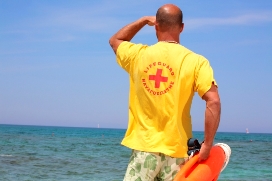Warm weather triggers an urge to be outdoors, but fun in the sun can be dangerous when the heat and humidity rise. In addition to sun burn, heat-related illness can spoil summer fun and send unsuspecting victims to the hospital. The human body keeps itself cool by allowing heat to escape through the skin and by evaporating the resulting perspiration. But if the body can not cool itself enough, the person could suffer from heat-related illness. Illnesses caused by overheating can become serious or even deadly if not treated. Exposure to heat kills approximately 400 Americans each year.
Who is at Risk?
-
Everyone is susceptible to heat-related illness. However, these groups are at a greater risk:
-
Senior citizens, especially those living alone in non-air-conditioned environments.
-
Infants and children.
-
People with medical conditions especially those with heart disease and high blood pressure.
Prevention
To help prevent heat-related illness, follow these safety precautions:
-
Avoid strenuous outdoor activities. When possible, reserve outdoor activities for the cooler morning and evening hours.
-
Wear loose-fitting, light-weight, light-colored clothing. Also apply sun block and wear a wide-brimmed hat.
-
Stay well hydrated and avoid alcoholic and caffeinated beverages.
-
Eat smaller meals more frequently.
-
Never leave children, adults or pets in a closed, parked vehicle. In the sun, closed car temperatures can rise from 78 degrees to 100 degrees in just three minutes.
Symptoms and Treatment
Heat-related illness is cumulative. If you experience symptoms, administer or seek treatment immediately.
-
Heat Cramps: Painful muscle cramps and spasms, usually in the legs and stomach. Treatment: Slowly rehydrate and stretch muscles.
-
Heat Exhaustion: Cool, moist, pale, flushed or red skin; headache, dizziness, weakness, exhaustion, and nausea or vomiting. Treatment: Rest in a cool place, loosen clothing, apply wet cloths to skin and rehydrate slowly. Call 9-1-1 if the victim vomits, refuses water or loses consciousness.
-
Heat Stroke/Sun Stroke: Hot, red and dry skin; decreased alertness or unconsciousness; weak high temperature. Treatment: Call 9-1-1 immediately. Apply wet cloths to the skin and ice pads to the wrists, ankles, underarms and neck.









